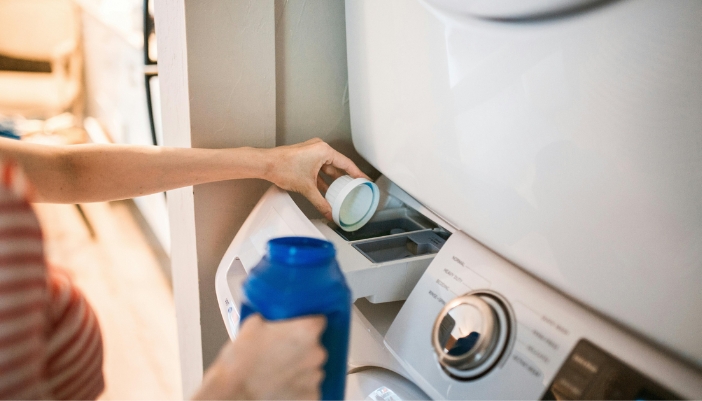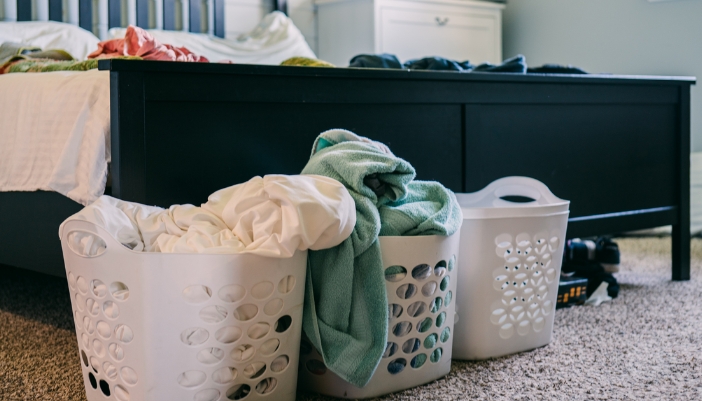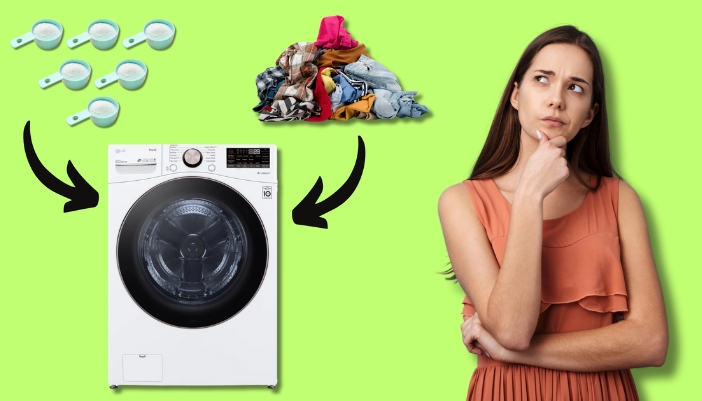Washing machines are a modern-day laundry lifesaver. We all want to get our clothes clean fast and efficiently, but there’s one common habit that could be doing more harm than good: overloading the washer.
It might seem like you’re saving time by squeezing in that last pair of jeans, but this shortcut can lead to safety hazards, poor wash results, and even costly repairs. In this blog, we’ll break down the consequences of overloading, how to tell if you’re doing it, and best practices for loading your machine the right way.

Understanding Washer Load Limits
Every washing machine, whether a top-load, front-load, or high-efficiency model, comes with a recommended load capacity. That information isn’t just a suggestion; it’s based on how the machine was engineered to clean effectively while protecting its internal components.
Pro tip: Always refer to your washer’s user manual. It includes helpful details like:
- Load weight limits
- Ideal water usage
- Proper detergent measurements
- Machine care recommendations
Ignoring these guidelines can strain the washer’s motor, suspension, and drum, leading to breakdowns or early replacement.
How to Tell If You’re Overloading Your Washer
Not sure if you’re guilty of overloading? Here are some red flags:
- Your washer makes loud banging or thumping noises during a cycle.
- Clothes come out still soapy or partially dry.
- The machine stops mid-cycle or flashes error messages.
- You notice excessive vibration or movement.
- Water leakage appears around the washer’s base.

What Happens When You Overload Your Washer?
1. Your Clothes Don’t Get Properly Clean
When clothes are packed too tightly, they don’t have room to move, reducing friction and agitation. This means detergent and water can't reach every item, leaving you with clothes that still smell funky or have detergent residue.
2. Your Machine Wears Out Faster
An overloaded washer works harder than it should, putting stress on the motor, drum, and bearings. This can lead to:
- Snapped belts
- Broken suspensions
- Costly repairs
- Shorter machine lifespan
If your washer sounds like it’s preparing for takeoff (i.e., extreme thumping), it’s likely due to an unbalanced and overloaded drum.
3. Overheating & Fire Hazards
Yes, it can be dangerous. Overworked motors can overheat, potentially damaging electronic components or, in rare cases, even starting a fire. Washing machines are built with safety mechanisms like automatic shutoffs, but overloading wears those protections down.
4. It Can Cause Leaks and Water Damage
Too many clothes prevent water from circulating properly, leading to inefficient draining and spinning. This can cause excess water to leak out of the machine, resulting in water damage to floors, walls, and even nearby electrical outlets. The last thing you want is a mini flood in your laundry room!
5. Mold & Mildew Growth
Excess detergent and moisture trapped by tightly packed loads can cause mold or mildew to grow inside your washer. This not only creates unpleasant odors but also poses health risks.
To prevent this, clean your washer regularly. Run out today to your favorite local appliance store and purchase some Affresh® to wash your washing machine!
Now that we have discussed how to tell if you’re overloading and the risks of overloading, let's explore how to properly load your washing machine for optimal results.

How to Load Your Washer the Right Way
Loading your washing machine correctly protects the appliance and ensures your clothes come out cleaner, fresher, and longer-lasting.
- Check the Manual: Always follow the manufacturer's guide for load size and fabric type.
- Leave Space at the Top: Clothes need space to move freely in the drum for effective cleaning. As a general rule, leave a hand's width of space between the top of the clothes and the drum. This allows water and detergent to circulate freely and ensures that clothes are thoroughly cleaned and rinsed.
- Balance the Load: Evenly distribute heavy and light items. Avoid washing bulky items alone (like a comforter or heavy towel) to prevent off-balance cycles.
- Avoid Over-Sudsing: Use the correct amount of detergent for the load size and water hardness. Use a high-efficiency (HE) detergent for HE washing machines.
- Separate Laundry by Fabric Type and Color: Washing similar fabrics and colors together helps prevent damage and color transfer. Delicate fabrics should be washed on a gentle cycle with a mild detergent.
Final Tips for Smart Laundry Habits
- Don’t leave wet laundry sitting in the machine. It promotes mold growth.
- Run a monthly cleaning cycle
- If your machine shakes or leaks often, have it inspected.
- Check out our appliance service options if your washer needs a tune-up
Save Your Washer…and Your Wallet!
Overloading your washer might seem like a time-saving hack, but the risks far outweigh the benefits. By following proper laundry practices, you’ll extend the life of your appliance, get better wash results, and avoid unexpected repair costs.
Need a new washing machine or parts? Visit us at Hallock’s, Morrone Electric, or Shore Appliances for expert guidance, affordable delivery, and scratch & dent deals on top brands.

Lillian Provost
Service Manager, Shore Appliances
lillian@shoreappliancesct.com
1416 Goldstar Highway
Groton, CT 06340 | 860.445.2471
